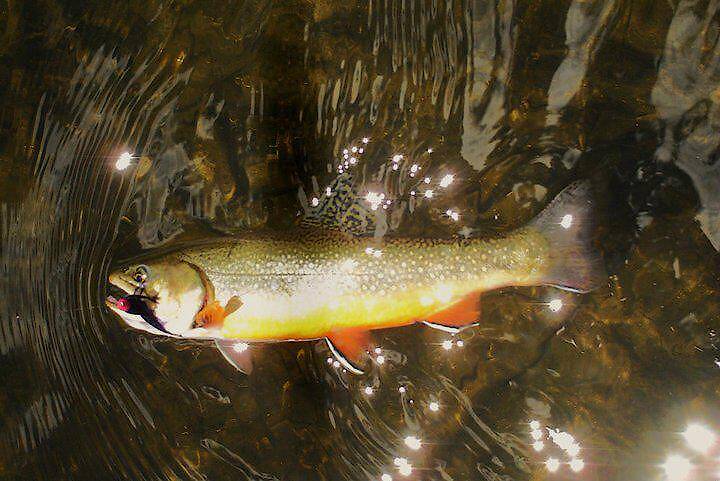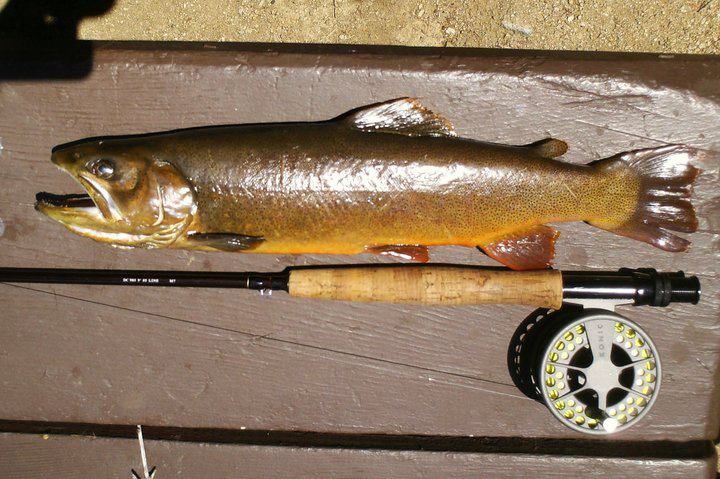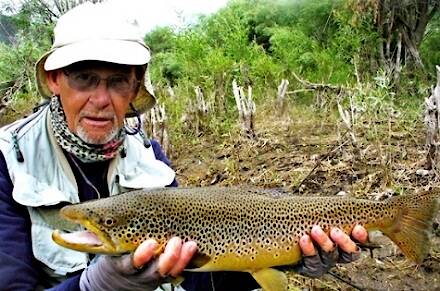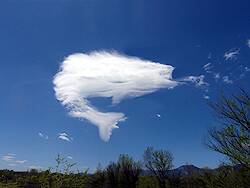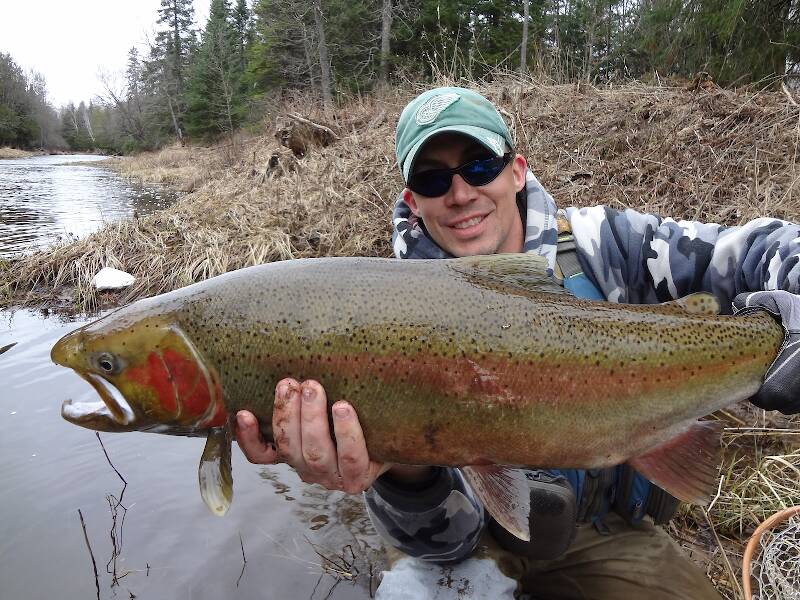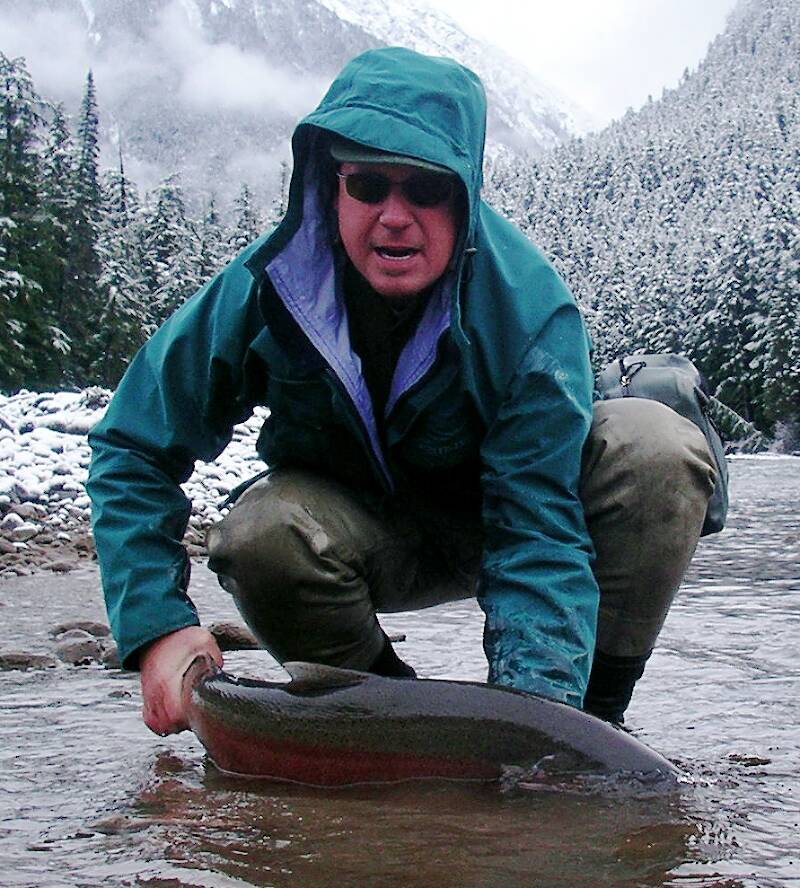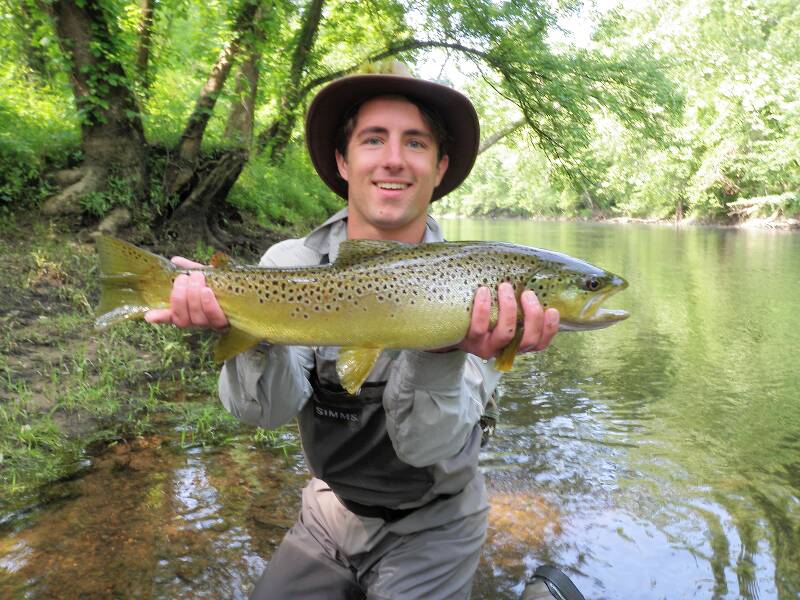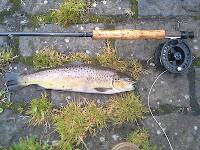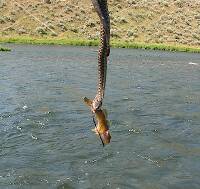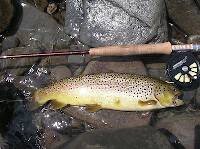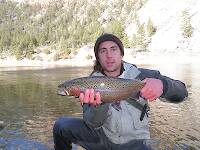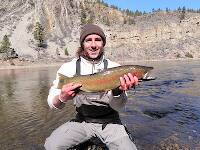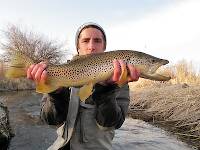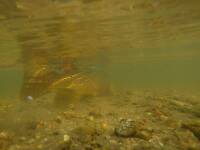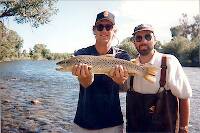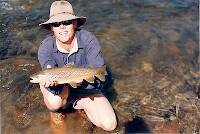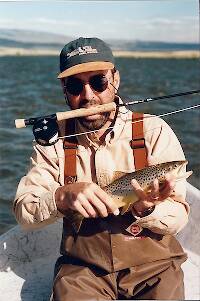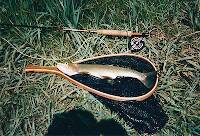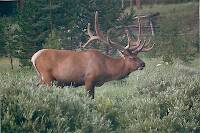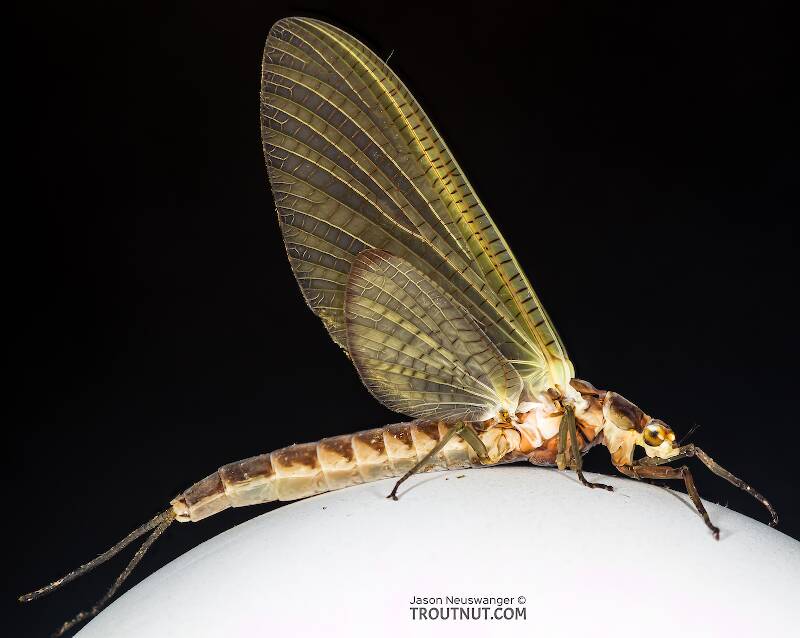
Hex Mayflies
Hexagenia limbata
The famous nocturnal Hex hatch of the Midwest (and a few other lucky locations) stirs to the surface mythically large brown trout that only touch streamers for the rest of the year.
Featured on the forum
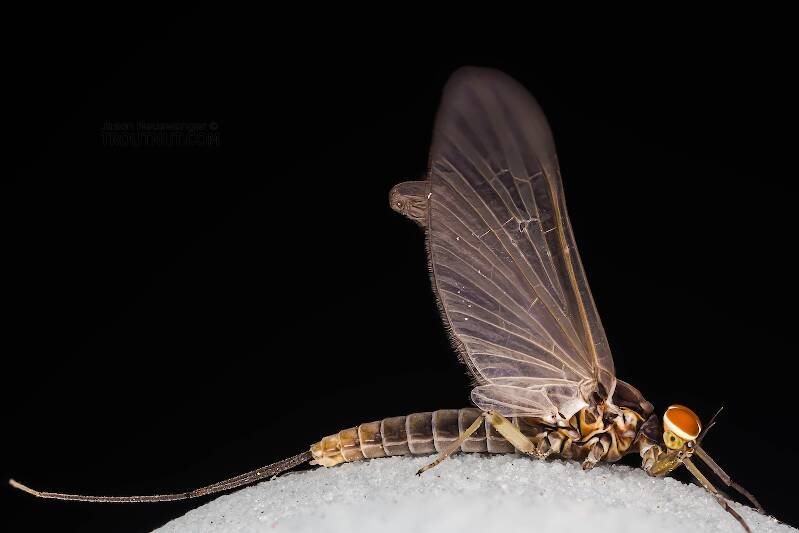
This dun emerged from a mature nymph on my desk. Unfortunately its wings didn't perfectly dry out.

Troutnut is a project started in 2003 by salmonid ecologist Jason "Troutnut" Neuswanger to help anglers and
fly tyers unabashedly embrace the entomological side of the sport. Learn more about Troutnut or
support the project for an enhanced experience here.
Wbranch on Feb 7, 2012February 7th, 2012, 9:35 am EST
Maybe some species of west slope cuttthroat. Looks like it's been dead. and in the sun, about a decade.
Catskill fly fisher for fifty-five years.
PaulRoberts on Feb 7, 2012February 7th, 2012, 10:09 am EST
It's a cutt -probably a Snake River Fine-Spotted, of the Yellowstone branch lineage. According to Behnke, there are 4 major evolutionary divergences of cutthroat (Coastal, Westslope, Yellowstone, and Lahontan), that each have more derivatives. The fine-spotted is one of two morphologies of the Snake River line
that diverged from the parent Yellowstone cutthroat during the last glacial period. It's native range is the stretch of the Snake River from Jackson Lake south to Palisades Reservoir and the tribs of that stretch. However it is the most widely stocked of the cutts, and if you follow stocking records, there are few places where such things have not been tried at least once.
that diverged from the parent Yellowstone cutthroat during the last glacial period. It's native range is the stretch of the Snake River from Jackson Lake south to Palisades Reservoir and the tribs of that stretch. However it is the most widely stocked of the cutts, and if you follow stocking records, there are few places where such things have not been tried at least once.
FishThirty on Feb 7, 2012February 7th, 2012, 10:09 am EST
It is long dead in the picture, when I landed this fish it was a brilliant shimmering gold all over. It did not jump when hooked, just a few runs and it came to net fairly easily, it would not revive and appeared to have a gill fungus on one side. I had no camera and the fish was obviously struggling to me, that along with its rare appearance led me to take it and hike back for a picture.
"What time is it? It's FISH THIRTY!"
FishThirty on Feb 7, 2012February 7th, 2012, 10:15 am EST
I thought about it being a cut, what threw me off was the spotting covered every surface of the fish head to tail. There were no sparse areas of spot coverage which I thought to be typical of cuts. I have spied this forum for years now, this may be my first post. I knew I could get some good info here, thanks!
"What time is it? It's FISH THIRTY!"
PaulRoberts on Feb 7, 2012February 7th, 2012, 10:25 am EST
I've not caught one, so I dunno about spot distribution, but critters are variable -that's why new derivations are even possible.
Nice catch btw. It's a big one. Probably that "headwater" had a lake, or large river, associated with it.
Thanks for sharing it.
Nice catch btw. It's a big one. Probably that "headwater" had a lake, or large river, associated with it.
Thanks for sharing it.
Pryal74 on Feb 7, 2012February 7th, 2012, 1:34 pm EST
It looks possibly like a stocked fish. Notice the very small, underdeveloped fins and the wispy tail. So it also might be a hybrid of some kind, but it's hard to see it clearly from the photo.
-James Pryal
Into The Wild Fly Fishing
Into The Wild Fly Fishing
Entoman on Feb 8, 2012February 8th, 2012, 12:20 am EST
Hey Jim,
Na... That's a beautiful wild west slope cutthroat, and it's spot pattern as well as it's gold color described when it was alive are not all that rare in really large specimens such as this. The fin damage is undeniably due to desiccation and the rough handling it suffered dangling from something on what was undoubtedly a long hike out. There's no denying from evidence in the photo that in life it was truly a gorgeous fish; probably one of the best examples I've ever seen.
Fishthirty -
Sorry, but I'm not buying that it was diseased to the point of death when you caught it. Even after the "jerky" treatment, it's body conformation looks way too healthy. Cutthroat are notorious for putting up lousy fights sometimes, which is probably the explanation for your concern.
Now killing a beautiful fish such as this is a personal decision and I don't stand in judgment, especially since it was taken from a remote location and arguably had little impact on the ecosystem other than opening up its niche for another fish to take its place and grow that big as well. The size of the head suggests it was possibly a very old fish, so who knows how many seasons it had left anyway (other than not many)? I once killed a 15 lb. brown from a high Sierra lake that hangs on my wall, so I'm the last guy to criticize. But, it is what it is... Anyway, a wild West Sloper this large is a once-in-a-life-time trophy worthy of pride in the accomplishment. I'm jealous.:) Did you have it mounted? If not, I hope you ate it. Please tell me it didn't end up as fertilizer in the garden or thrown in the garbage...
Best regards!
Na... That's a beautiful wild west slope cutthroat, and it's spot pattern as well as it's gold color described when it was alive are not all that rare in really large specimens such as this. The fin damage is undeniably due to desiccation and the rough handling it suffered dangling from something on what was undoubtedly a long hike out. There's no denying from evidence in the photo that in life it was truly a gorgeous fish; probably one of the best examples I've ever seen.
Fishthirty -
Sorry, but I'm not buying that it was diseased to the point of death when you caught it. Even after the "jerky" treatment, it's body conformation looks way too healthy. Cutthroat are notorious for putting up lousy fights sometimes, which is probably the explanation for your concern.
Now killing a beautiful fish such as this is a personal decision and I don't stand in judgment, especially since it was taken from a remote location and arguably had little impact on the ecosystem other than opening up its niche for another fish to take its place and grow that big as well. The size of the head suggests it was possibly a very old fish, so who knows how many seasons it had left anyway (other than not many)? I once killed a 15 lb. brown from a high Sierra lake that hangs on my wall, so I'm the last guy to criticize. But, it is what it is... Anyway, a wild West Sloper this large is a once-in-a-life-time trophy worthy of pride in the accomplishment. I'm jealous.:) Did you have it mounted? If not, I hope you ate it. Please tell me it didn't end up as fertilizer in the garden or thrown in the garbage...
Best regards!
"It's not that I find fishing so important, it's just that I find all other endeavors of Man equally unimportant... And not nearly as much fun!" Robert Traver, Anatomy of a Fisherman
PaulRoberts on Feb 8, 2012February 8th, 2012, 5:54 am EST
To be picky, or accurate: It shouldn't be a true Westslope, as, according to Behnke, they are large spotted. In fact almost all cutts are large spotted, including most of the Yellowstone group. The two Snake River strains consist of a large-spotted ones, and the single fine-spotted one.
But there has been so much stocking, and resulting intergrades, it may be impossible to tell who's who -except for those with the Fine-spotted bloodline, which descends from the Snake River derivation, rather than the Westslope.
But there has been so much stocking, and resulting intergrades, it may be impossible to tell who's who -except for those with the Fine-spotted bloodline, which descends from the Snake River derivation, rather than the Westslope.
Jesse on Feb 8, 2012February 8th, 2012, 8:04 am EST
Honestly its hard to look at this fish and say that its a west slope cutthroat trout. I have been fishing in Montana now for two years, and this fish doesn't resemble one except for the tiny pinprick spots covering the body. Maybe the fish being out of the water and mixture of sun has strongly changed the color by the time the picture was taken. This fish almost looks like it has some bull trout in it; with darker pigment throughout. The area that it was caught in, depending what body of water the tributary was pouring into, could very well be a bull trout spawning destination. A picture of the fish fresh out of the water might help with the identification a little more, tough to say. Also, cutthroats, which is probably the second most common fish i have been catching in the rivers around Missoula, are one of the hardest fighting fish out of the local species, possibly the first. The larger fish fight harder then browns, with their more vicious, short runs and compare strongly to the big wild rainbows here. I have caught all species in the 20inch range, and the cutthroat never ceases to amaze me when it comes to 'tugging'.
Most of us fish our whole lives..not knowing its not the fish that we are after.
http://www.filingoflyfishing.com
http://www.filingoflyfishing.com
PaulRoberts on Feb 8, 2012February 8th, 2012, 8:38 am EST
One reason the Fine-spots were so popular with hatcheries is that they are considered the hottest fighters of the cutts. They are described as "closer to rainbows" than other cutts, in terms of fight.
However, when talking individual fish, fight matters little bc conditions can affect this enormously. From the description, it maybe that the fish was a post-spawner, probably in the stream for that purpose -why I asked about a lake or large river associated with that "headwater". It certainly did NOT grow that big in a headwater.
However, when talking individual fish, fight matters little bc conditions can affect this enormously. From the description, it maybe that the fish was a post-spawner, probably in the stream for that purpose -why I asked about a lake or large river associated with that "headwater". It certainly did NOT grow that big in a headwater.
Entoman on Feb 8, 2012February 8th, 2012, 8:39 am EST
...it may be impossible to tell who's who -except for those with the Fine-spotted bloodline, which descends from the Snake River derivation, rather than the Westslope.
You're right Paul, I stand corrected. I tend to use the term to reflect the geography rather than the gene pool. I readily admit to not having a clue to the latter.
Honestly its hard to look at this fish and say that its a wild,...
Jess - Really? Are you sure? That guy looks pretty dried out, so judging by fin condition isn't practical. As to color, a lot depends on the habitat. Maybe it's my romantic nature, but I tend to assume all back country trout are wild (not to be confused with native). I wasn't aware that F & G depts. travel into the high lonesome to plant brood stock in small streams.
"It's not that I find fishing so important, it's just that I find all other endeavors of Man equally unimportant... And not nearly as much fun!" Robert Traver, Anatomy of a Fisherman
PaulRoberts on Feb 8, 2012February 8th, 2012, 8:43 am EST
The real telling attribute of virtually all factory fish, except those stocked as fry or fingerlings, is a warped leading edge of the dorsal. The Pecs and pelvics will warp too, but the dorsal is the first to go. This fish has a pretty clean dorsal, however there is a very slight warp low on the dorsal, which MIGHT indicate hatchery origin and stocked as a fingerling or small parr.
Kurt, I gathered you meant geographically, Should have said so, so's I don't sound ... bunched.
Kurt, I gathered you meant geographically, Should have said so, so's I don't sound ... bunched.
Jesse on Feb 8, 2012February 8th, 2012, 8:58 am EST
The fish is definitely wild (in my opinion), i was referring to a wild west slope cutty, i stand corrected. I wasn't clear in my writing!
Most of us fish our whole lives..not knowing its not the fish that we are after.
http://www.filingoflyfishing.com
http://www.filingoflyfishing.com
Entoman on Feb 8, 2012February 8th, 2012, 9:35 pm EST
Ah! I misunderstood you Jess, sorry about that!:) Paul is right though, technically this probably isn't a true West Sloper from a genetic standpoint (not that we ever get technical around here, right Paul?:)). I'm gonna call on my nephew Elktrout so we get his input. If he doesn't read this and post, Ill give him a call to bug him 'till he does. He has the native ones all scoped in the panhandle region of Idaho. Like Bigfoot, he secretly sneakes around all their haunts in the back country where no pesky fish culturist has messed with nature's order.:)
"It's not that I find fishing so important, it's just that I find all other endeavors of Man equally unimportant... And not nearly as much fun!" Robert Traver, Anatomy of a Fisherman
PaulRoberts on Feb 9, 2012February 9th, 2012, 6:12 am EST
Beware: There were a lot more footsteps before us than we may realize. Most high mountain lakes and upper tribs never had fish in them of any kind, until people started hauling them up in buckets, and not keeping records, and later by airdrop. There are precious few (if any) places left that fish aficionado's (of many ilks) haven't messed with things. We can consider nature's order pretty much "messed with" across the board.
Here's a cool story: The reintroduction of "Greenback cutthroat" here on the East slope of the divide. They were considered extirpated, replaced with 'bows, brookies, and an assortment of other cutts -mostly Yellowstones (widely propagated) and then Yellowstones of the Colorado River derivative (closest relation to the thought-extirpated Greenback), until the Greenback was re-discovered. They were found in the 1960's in the tiny willow choked upper reaches of a little stream that cuts the canyon I happen to live on the top of. Little Como Creek was found to have an existing population of true Greenbacks, and from this stock, the current reintroduction stemmed. They are beautiful fish, but small and known not to fight well. The price of protecting biodiversity I suppose. I'm thrilled to have them and feel my land is the richer for them. We still have plenty of browns, brookies, cutts, bows, and cuttbows to chase.
Also, I edited above to put the Fine-Spotted in its proper (more accurate) place.
Here's a cool story: The reintroduction of "Greenback cutthroat" here on the East slope of the divide. They were considered extirpated, replaced with 'bows, brookies, and an assortment of other cutts -mostly Yellowstones (widely propagated) and then Yellowstones of the Colorado River derivative (closest relation to the thought-extirpated Greenback), until the Greenback was re-discovered. They were found in the 1960's in the tiny willow choked upper reaches of a little stream that cuts the canyon I happen to live on the top of. Little Como Creek was found to have an existing population of true Greenbacks, and from this stock, the current reintroduction stemmed. They are beautiful fish, but small and known not to fight well. The price of protecting biodiversity I suppose. I'm thrilled to have them and feel my land is the richer for them. We still have plenty of browns, brookies, cutts, bows, and cuttbows to chase.
Also, I edited above to put the Fine-Spotted in its proper (more accurate) place.
Creno on Feb 9, 2012February 9th, 2012, 7:17 am EST
As much as we would like to think we did a good job with the Greenback, here is a little more of the story. I haven't heard much about this since. We seldom leave well enough alone.............
http://www.sciencedaily.com/releases/2007/09/070905133602.htm
http://www.sciencedaily.com/releases/2007/09/070905133602.htm
PaulRoberts on Feb 9, 2012February 9th, 2012, 9:51 am EST
It was too good to be true wasn't it.
"The misidentification likely was caused by the stocking of fish in the late 1800s and early 1900s when railroads delivered hundreds of thousands of baby trout around the state of various species and subspecies for people to stock in local waters, said Metcalf. "This illustrates the need for biologists to consider that the species may have been introduced by the industriousness of humans before the documentation of the native flora and fauna of the area was recorded," she said."
...
"The misidentification likely was caused by the stocking of fish in the late 1800s and early 1900s when railroads delivered hundreds of thousands of baby trout around the state of various species and subspecies for people to stock in local waters, said Metcalf. "This illustrates the need for biologists to consider that the species may have been introduced by the industriousness of humans before the documentation of the native flora and fauna of the area was recorded," she said."
...
FishThirty on Feb 9, 2012February 9th, 2012, 11:34 am EST
This fish indeed had a bad fungus or rot on its gills on one side. I thought something was wrong as soon as I hooked it, there was no strength to the fish at all, just weight. No head shakes, it only was able to strip drag from the reel when it turned into the current. It "ran" downstream a few feet, then turned into calm water. There it undulated slowly and lazily around me in ever increasing circles until I netted it. The entire process happened in just a short moment. Something was wrong. Its sad because I almost feel like it didn't count.
Well, the fish was eaten at a family reunion along with stocker rainbows that everyone caught in a lake near Buena Vista. If I ever desire it to hang on my wall, I will order a blank and paint it up just like I remember. After visiting everyone for a couple days I ran off into the woods. My cousin and I set out on our own to do the "artsy stuff" as my uncle calls it. It was a great trip, I caught more trout in a week than I had in a year in Maryland. All on light tippet, on my flies, all released barring the one in the pic. I did several hikes, tangled with some greenbacks, whooped up on some massive brookies, brownies in beaver dams... Man I love Co! I have fished allot of places, even looked at fish for a living over the last 10 years, and have never laid eyes a trout like the one. Thanks so much for the great feedback everyone. Love the forum!
Well, the fish was eaten at a family reunion along with stocker rainbows that everyone caught in a lake near Buena Vista. If I ever desire it to hang on my wall, I will order a blank and paint it up just like I remember. After visiting everyone for a couple days I ran off into the woods. My cousin and I set out on our own to do the "artsy stuff" as my uncle calls it. It was a great trip, I caught more trout in a week than I had in a year in Maryland. All on light tippet, on my flies, all released barring the one in the pic. I did several hikes, tangled with some greenbacks, whooped up on some massive brookies, brownies in beaver dams... Man I love Co! I have fished allot of places, even looked at fish for a living over the last 10 years, and have never laid eyes a trout like the one. Thanks so much for the great feedback everyone. Love the forum!
"What time is it? It's FISH THIRTY!"
PaulRoberts on Feb 9, 2012February 9th, 2012, 11:40 am EST
Fish do get sick, esp around spawning time. And.. there's nothing wrong with taking trout -even big ones - in a LOT of waters.
Thanks for posting your neat catch.
Thanks for posting your neat catch.
Quick Reply
Related Discussions
Topic
Replies
Last Reply
1
Mar 10, 2007
by Troutnut
by Troutnut
1
Jun 12, 2010
by Jesse
by Jesse


